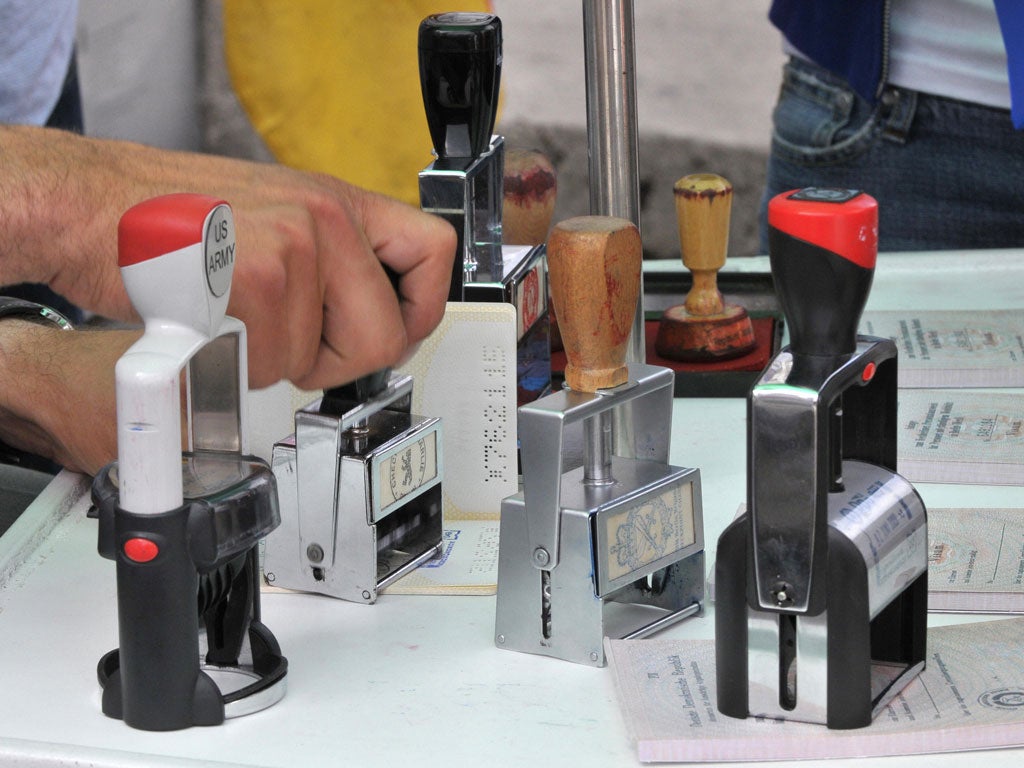Tony Wheeler: Someone stamp my passport – please!
The View From Here: On official welcomes

Like Crazy, the Sundance-winning film, tells the complex love story of an Englishwoman named Anna forcibly separated from her American boyfriend, Jacob, by nasty old Homeland Security when she overstays her visa after studying in LA. My recent travels featured exactly the opposite problem: I couldn't find an immigration official to check my visa and stamp my passport.
I'd travelled up through the Solomon Islands in the south-west Pacific, gone diving in Honiara and Ghizo, then taken the weekly Twin Otter flight, along with six other passengers, to Balalae Island. I stayed at the Catholic mission's guest house on nearby Shortland Island. On Saturday I joined some islanders on a "banana boat" (30hp Yamaha outboard, not a lifejacket to be seen) to cross the 20-mile gap to Bougainville, the westernmost island in Papua New Guinea.
I'd arranged a visa in advance through the PNG consulate in Canberra. I didn't expect to find an immigration desk on the beach, but five miles inland, the town of Buin didn't have one either. The local police commander noted in my passport that I'd dropped by, and said I should sort things out when I found a suitable office. Three hours up the coast, Arawa – the former mining town for Rio Tinto's giant Panguna mine – didn't have one. Nor did Buka, the administrative capital for Bougainville, at the northern end of the island. Finally, on my third island, New Britain, I found a man in the customs department in Kokopo with the appropriate stamp. After a week in PNG, I'd officially arrived.
Over the years I've turned up at a few places where there was no immigration official on hand. I joined a Russian polar ship, chartered to a Canadian adventure travel company and repositioning from the Antarctic to the Arctic. From Valparaíso in Chile we sailed via Easter Island, Pitcairn Island and a bunch of other remote islands to Tahiti in French Polynesia. Our first stop – of six – in French Polynesia was on Mangareva in the Gambier Islands. To get our passports stamped we had to pay for an immigration official to fly in from Tahiti, four hours' flying time away. He didn't fly back to Tahiti; he just joined us for the cruise.
On at least one occasion I've avoided immigration officials. Departing Thailand by land many years ago I had a passport stamp inbound which permitted an outbound departure only by air. I observed that all sorts of local traffic simply zipped past the Thailand-Malaysia immigration shed, heading to farms in the no-man's-land before Malaysia's official frontier, so I mingled in with them on my motorcycle and cruised past as well. Nobody noticed – although they're probably more efficient these days.
When European border controls are so invisible, it's a little surprising how time consuming and officious the border crossings between the US and Canada can be. Many of the more remote crossing points are not even open 24 hours. Curiously, US and Canadian opening hours often don't coincide. There's also a $6 charge for entering the US.
The Angle Inlet crossing point between Manitoba and Minnesota isn't even staffed. New arrivals are supposed to use a video telephone provided to tell the border office that they're crossing. Do you hold your passport page up to the camera? And would they have noticed Anna's overstay?
Tony Wheeler is co-founder of Lonely Planet travel guides
Subscribe to Independent Premium to bookmark this article
Want to bookmark your favourite articles and stories to read or reference later? Start your Independent Premium subscription today.

Join our commenting forum
Join thought-provoking conversations, follow other Independent readers and see their replies